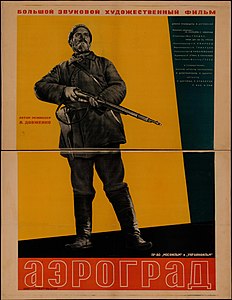Aerograd
| Movie | |
|---|---|
| Original title | Аэроград / Aerograd |
| Country of production | Soviet Union |
| original language | Russian |
| Publishing year | 1935 |
| length | 82 minutes |
| Rod | |
| Director | Alexander Dovchenko |
| production | GUKF, Mosfilm, Ukrainfilm |
| camera |
Eduard Tissé (exterior shots) Michail Gindin (interior shots) Nikolai Smirnow (aerial shots) |
| occupation | |
| |
Aerograd is a 1935 Soviet propaganda film directed by Alexander Dovschenko .
action
Siberia in the 1930s. The Soviet Union feels threatened in the far east of the country by Japanese lust for great power and is therefore planning to build a huge urban outpost called “Aerograd”, a kind of impregnable Soviet metropolis to secure this part of the country and protect it from foreign invaders. The hunter Stepan Gluschak is already fighting day in and day out against foreign invaders in Russian territory. He was able to kill one, but his companion managed to escape. He holed up in the hut of Gluschak's friend Vasily Chudjakow. What Stepan does not know: Vasily secretly conspires with the enemy. At the same time, another Russian named Aniki Schabanow incited the population against the Bolshevik system.
Thereupon Gluschak rounds up his old Red Army cronies from bygone revolutionary times to defend the communist fatherland. Together they knock down the enemy in the form of religiously guided samurai . There is also a man-to-man fight, friend against friend, Glushak against Chudjakov, who is killed by the Bolshevik model hero of this story himself. Now finally the building of the bulwark against whichever enemy can begin and an armada of Soviet planes is flying the builders of the new city Aerograd in the Soviet portals of the taiga.
Production notes
Aerograd celebrated its world premiere on November 6, 1935. The film never ran in Germany.
Reviews
“Dowschenko was obsessed with the idea of this city, the exact location of which he determined on long journeys through Siberia. According to his ideas, his film should give the impetus for Aerograd to really be built. (…) His film is rather a kind of mystical poem in which the Russians appear like legendary heroes. (...) At the end there is an apotheosis of the Soviet air fleet, which embodies the principle of power and progress. "
“In his [Dowschenkos] later (sound) films, however, pathos took on an increasingly stronger position, and so the anti-Japanese film turned from the building of a model communist city to an East Asian bulwark,“ Aerograd ”, or the anti-Polish hero worship that agitated against Ukrainian independence "Shchors" to seemingly artificial propaganda in the sense of Stalin's cult of personality and leader. "
Web links
- Aerograd in the Internet Movie Database (English)
